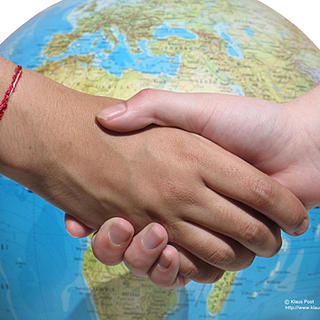Paradise is found in God's love
- Missio Scotland
- Sep 29, 2021
- 4 min read

MARTIN Atemnkeng was a clever man. He knew what people liked. He also knew how to make a franc or two.
He ran the 'Paradise Bar' next to the market place in Menji, a growing village in a remote part of south west Cameroon in West Africa. The Paradise was a great place for people to buy bottles of beer, sit and catch up on the latest gossip and find out the latest intrigue going on at the Chief’s palace.
Despite the remoteness of his location, Atemnkeng had ambitions. He was always thinking of ways to attract people to his bar. More people, more money.
So one fine day in the dry season, he took off to Nigeria, the country next door to Cameroon, where the latest gadgets and attractions could be bought and smuggled back over the border in the dead of night. He returned two weeks later with a small electric generator, a Sony TV, a DVD player and an assorted collection of DVDs that he was assured would be popular.
To great fanfare—which consisted of handwritten posters stuck on trees all along the main road—he announced that the following Saturday night he would show DVDs at his bar. The DVDs in question were a collection of box sets of the American TV programme Dynasty, a glitzy saga from the USA about very rich people who schemed and plotted against one another against a fabulous background of stylish clothes, big mansions, big cars and changing loyalties. Everyone was welcome.
Few people in Menji had seen a TV let alone Dynasty and the number of active light bulbs could be counted on one hand. The village was buzzing all week in anticipation.
On the Saturday night, out of nosiness, I rode past the Paradise Bar on my motorbike to see how things were going. The place was mobbed and there were so many people that the TV—glowing like a beacon in the darkness—had been placed at the doorway so that the crowd outside could view the goings on of the rich in the US. The wealthier members of Menji society sat in sofas or armchairs at the front. The standard of seating decreased according to social status until it reached Taku the tailor squatting on an old beer crate at the back. As always in Africa, there seemed to be hundreds of children milling around everywhere. The ‘ladies’ who had a dubious reputation in the area circled round with one eye on the TV and the other scanning the crowd for potential customers who might be inspired by the wickedness being played out on the screen. It was the social event of the year.
The next day I met Julius Agendia, a naturally optimistic young man who was about 17. I asked him how it all went and what did he learn from watching the TV. He looked at the ground for a while and then said: "I learned that I am poor and that Menji is very small and backward."
In the blink of an eye, at the flick of a switch, his world had become smaller. All the important things which enriched his life and which held everything together had lost their once powerful significance; what had satisfied and thrilled him before was now replaced with hunger and longing.
It takes a strong person not to be swayed by enormous wealth and power when it is presented with polish and style and which proclaims that you can have this too. That is why we see young Africans traversing the Sahara Desert to cross perilous seas in flimsy dinghies and who end up selling fake watches and handbags on street corners in European cities. The truth is that it is all an illusion which often ends in tears and a deeper poverty, a poverty of the heart and soul.
In his apostolic letter, Maximum Illud, of 1919, Pope Benedict XV wrote: "The Catholic Church is not [to be] an intruder in any country." [1] The Christian religion is not a European religion and the Christian missionary is 'not working as an agent of his country, but as an ambassador of Christ.' [2]
The Gospel does not deny that we should seek to better our lives materially, but the priority must always be that we are ‘ambitious for the higher gifts’, for that relationship with God which gives us peace and purpose no matter our circumstances.
The work of a missionary is to make people’s lives richer: spiritually, materially, psychologically, emotionally and socially, because if we are close to Christ, to God, then we can have a peace which the world cannot give. More than ever before, the term ‘mission’ is not so much about going to foreign lands to spread the Gospel, but about being a witness to the presence of God in our own place, our own society, especially here in the Western World which is materially rich, but poor in so many other ways.
This is why Pope Francis has declared October 2019 as an ‘Extraordinary Mission Month’ to not only commemorate the centenary of the writing of Maximum Illud, the foundational thought on how ‘mission’ is to be carried out, but also his insistence that ‘mission’ starts with respect and ends with bringing others to know and love God wherever we may find ourselves.
[1] Maximum Illud, Pope Benedict XV, 30 November 1919, para 16
[2] Ibid., para 20






Comments